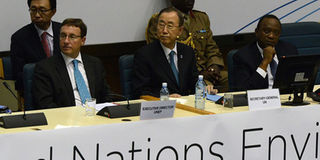Experts link poaching to terror

United Nations Secretary General Ban Ki-moon (C) and Kenyan President Uhuru Kenyatta (R) at the first session of the United Nations Environment Assembly (UNEA) in capital Nairobi, on June 27, 2014. Mr Ban Ki-moon recently asserted that many terror groupings in Africa are significantly supported by poaching and earnings from other environmental crimes. AFP PHOTO / SIMON MAINA
What you need to know:
- Alarmingly, ivory from poached elephants is believed to be the primary source of income for Joseph Kony’s Lord’s Resistance Army (LRA), which has for long been a thorn in the flesh of Ugandan authorities.
- As if to further underscore that scenario, the report also alarmingly disclosed that Somalia’s Al-Qaeda-linked Al-Shabaab alone are estimated to make between $38 million and $56 million per year from the illegal trade in charcoal.
Following widespread calls for more concerted efforts in the war against terrorism, UN Secretary-General Ban Ki-moon recently asserted that many terror groupings in Africa are significantly supported by poaching and earnings from other environmental crimes.
Mr Ban made the alarming revelations on June 28 during a visit to Kenya. He also decried the fact that Kenya’s wildlife is under threat from poaching, illegal wildlife trafficking and human-wildlife conflict.
The UN boss’s dramatic statement came days after the release of a milestone UN report on global environmental crime on June 24. The report featured prominently during a week-long global environment conference of the newly created United Nations Environment Assembly (UNEA) at Unep’s Nairobi headquarters.
While revealing that environmental crime is reportedly worth up to $213 billion a year, the report disclosed that environmental crime “(poses) a serious threat to sustainable development, livelihoods, good governance and the rule of law in different African countries.”
As if to further underscore that scenario, the report also alarmingly disclosed that Somalia’s Al-Qaeda-linked Al-Shabaab alone are estimated to make between $38 million and $56 million per year from the illegal trade in charcoal.
“Beyond immediate environmental impacts, the illegal trade in natural resources is depriving developing economies of billions of dollars in lost revenues just to fill the pockets of criminals,” said UN under-secretary-general and executive director of Unep, Mr Achim Steiner.
Alarmingly, ivory from poached elephants is believed to be the primary source of income for Joseph Kony’s Lord’s Resistance Army (LRA), which has for long been a thorn in the flesh of Ugandan authorities. Insurgents in Central African Republic and Democratic Republic of Congo also carry out ivory poaching, the report said.
Janjaweed militias
Poached ivory also benefits the fearsome Janjaweed militias behind atrocities in Sudan’s Darfur region, who reportedly also operate in Niger and Chad, the UN report further said.
In the meantime, a different kind of regional adversity — a serious Ebola epidemic — last week brought together 11 African nations that might in different circumstances have been strange bedfellows.
In the event, the countries’ representatives deliberated during an emergency meeting held last Wednesday in Accra, Ghana, and hosted by the World Health Organisation (WHO).
The meeting brought together health ministers from Guinea, Liberia and Sierra Leone, the three affected countries, and was also attended by officials from Cote d’Ivoire, Mali, Guinea Bissau and Senegal, as well as Uganda, DRC, Gambia.
Amid mounting alarm in the region and elsewhere, participants took a united front against the rapidly mounting Ebola epidemic that first broke out in February.
Reacting to a rising death toll caused by the epidemic, which has already claimed hundreds of lives in the region, the WHO has sent dozens of experts to West Africa in recent months to try and contain the deadly threat.
While the epidemic — described as the worst in history — has particularly affected Guinea, where Ebola cases were first reported, it has also resulted in a rapidly increasing number of cases in Sierra Leone and Liberia.
Last week Samuel Muhumuza Mutoro, a Ugandan doctor in the latter country, reportedly succumbed to the virus while treating patients.
In Sierra Leone, the government announced on Wednesday that President Ernest Bai Koroma and his cabinet will contribute portions of their July salaries to a fund to fight the epidemic in the country.
Back to Mr Ban’s views, the UN boss declared that wildlife crime is not a simple threat to animals, but is also a major security impediment, given its links to organised crime and insurgent groups.
“The same routes used to smuggle wildlife products and timber across countries are often used to traffic weapons, drugs and people,” he reportedly said following the release by UN and Interpol of the crucial report on environmental crime.





